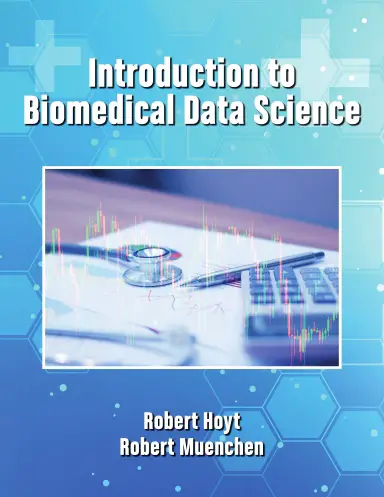Introduction to Biomedical Data Science aims to fill the data science knowledge gap experienced by many clinical, administrative, and technical staff. The textbook begins with an overview of what biomedical data science is and then embarks on a tour of topics beginning with spreadsheet tips and tricks and ending with artificial intelligence. In between, important topics are covered such as biostatistics, data visualization, database systems, big data, programming languages, bioinformatics, and machine learning. The textbook is available as a paperback and ebook. Visit the companion website at https://www.informaticseducation.org for more information. Key features: Real healthcare datasets are used for examples and exercises; Knowledge of a programming language or higher math is not required; Multiple free or open source software programs are presented; YouTube videos are embedded in most chapters; Extensive resources chapter for further reading and learning; PowerPoints and an Instructor Manual.

AIM Magazine Book Review
Review of Introduction to Biomedical Data Science
This volume on biomedical data science is an excellent reference for all those interested in data science in the healthcare domain. Most of the reference books in this domain lack exact relevance for the clinician but this reference is much more relatable. What is very helpful is that one does not have to have programming skills to enjoy the interactive sections of the book. It also has an impressive balance of theory and practice: while it covers essential topics such as overview of biomedical data science (data analytical processes and major types of analytics), biostatistics primer, introduction to databases, and machine learning, it also has chapters on practical topics such as spreadsheet tools and tips as well as programming languages for data analysis. There is also a very helpful section on biomedical data science resources as well as exercises (with step by step instructions) and references for each of the chapters, and this compendium renders the book an ideal companion to the beginner student to the more advanced practitioner.
Review of Data Preparation and Exploration: Applied to Healthcare Data
The same authors of the aforementioned book published this companion volume on the part of the data science project that is both daunting and fundamental: data preparation and exploration. This book is the prefect complementary volume to the Introduction to Biomedical Data Science as it is a very hands-on and practical resource for data preparation (raw data to data cleanup and leakage) and exploration (near zero variance, scaling, binning, and dimension reduction). The third section is focused on background of a data science project (defining the problem all the way to deploying the model) and automated data preparation and exploration to render this difficult area more manageable for especially the beginner. Among the many strengths of this book is its use of biomedical datasets (including a chapter on health data resources) in demonstrations and exercises, and another advantage is its myriad of resources, including many video clips of relevant topics. Similar to their prior work, this book is also a good balance between theory (topics such as imbalanced datasets and missing data reconciliation) and practice.
These two timely books reflect the decades of unparalleled wisdom and hands-on experience that Dr. Hoyt has in both biomedical informatics as well as biomedical data science. His personal mission to promulgate informatics and data science to be available and accessible to all practitioners is obvious in the details of these pages of both works. We all owe Dr. Hoyt a debt of gratitude for producing this set of works that is both enjoyable to peruse and useful to read.
November 30th, 2020
Anthony Chang, MD, MBA, MPH, MS
Founder, AIMed
Chief Intelligence and Innovation Officer
Medical Director, The Sharon Disney Lund Medical Intelligence and Innovation Institute (MI3)
Children’s Hospital of Orange County
Editor, Intelligence-Based Medicine